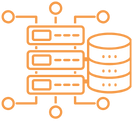How Ginger Nut Deliver
Our training delivery is based on a blended model of one-to-one sessions, at least every 4 weeks, with group sessions, webinars, online courses, video, and additional support as required. This means that our learners have the guidance they need as well as the flexibility to learn around the requirements of their jobs. We find that this approach reduces disruption for the learners and their line managers giving everyone the best chance of benefitting from the training and completing the course.
To support learning, all learners are given access to LinkedIn Learning, including bespoke channels designed to support their apprenticeship and Perlego, which includes full searchable access to hundreds of thousands of textbooks to support study.
Key areas of learning include:
- Analysis and planning
- Introduction to requirements engineering
- Overview of software development methodologies
- Roles and responsibilities of the software development team
- Case studies of software development projects
- Translating business into technical requirements
- Design
- Systems design
- System modelling techniques
- Secure software design
- Develop and build
- Software patterns
- Building reusable and maintainable software
- Tools and methods for documenting projects
- Repositories and version control
- Change control and collaborating with other developers
- Testing
- About software quality
- Quality and testing
- Deployment
- Approaches to deploying/implementing software
- Case studies of software implementations
- Tools for deploying software
- Maintenance
- Introduction to IT service management
Alongside the apprenticeship we offer additional supporting training and qualifications through the Cisco Networking Academy. These are:
- Cisco Networking Academy CPA – Programming Essentials in C++ (usually months 1-7)
- Cisco Networking Academy: CPP: Advanced Programming in C++ (usually months 8-14)
Where required, we can offer equivalent courses on employer specific technology – such as Python, Django, PostGreSQL, AWS, HTML5, CSS and JS-Typescript.
Project Activity and Portfolio Building
Once these exams have been successfully completed, we start to focus more on the learner’s portfolio to show evidence of all knowledge, skills and behaviours and how they have been used in their role.
The learner will complete a work based project for their End Point Assessment and the scope of the work will need to be submitted to the End Point Assessment Organisation at gateway. This project requires the learner to research and develop a software solution, based on a specification from their employer or a client. This may take up to 7 weeks to complete with additional weeks available to write the report.
Gateway and End Point Assessment
End Point Assessment will consist of a project report, followed by questioning, and a professional discussion based on the portfolio.
In preparation for gateway, we will put all learners through at least one mock project and one mock discussion to ensure they ready for End Point Assessment.
